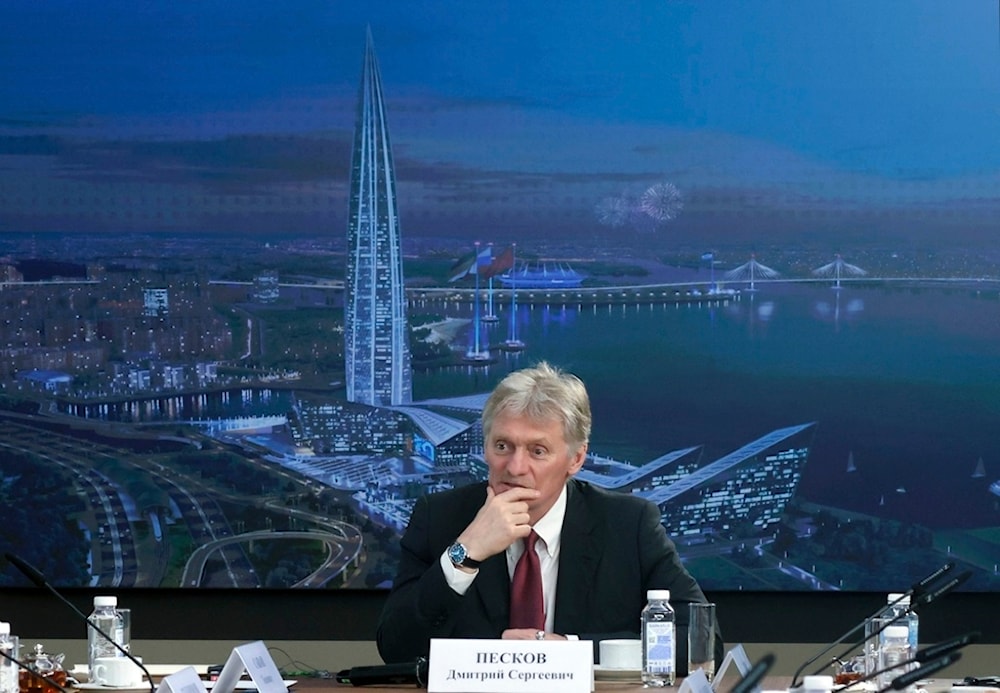Putin's peace proposal 'not an ultimatum': Kremlin spox
Kremlin spokesman Dmitry Peskov said that Putin's proposal should not be construed as an ultimatum but rather as a genuine effort towards resolving the ongoing tensions between Russia and Ukraine.
-

Kremlin spokesman Dmitry Peskov attends a meeting of Russian President Vladimir Putin with senior news leaders of international news agencies on the sidelines of the St. Petersburg International Economic Forum at the Lakhta Center skyscraper, the headquarters of Russian gas monopoly Gazprom in St. Petersburg, Russia, on Wednesday, June 5, 2024. (AP)
In response to Ukrainian President Volodymyr Zelensky's characterization of Russian President Vladimir Putin's peace proposal as an "ultimatum," Kremlin spokesman Dmitry Peskov clarified on Friday that the proposal is, in fact, a sincere attempt at initiating peace negotiations.
Speaking to the Izvestia newspaper, Peskov said that Putin's proposal should not be construed as an ultimatum but rather as a genuine effort towards resolving the ongoing tensions between Russia and Ukraine.
"It is surely a misunderstanding, it is exactly a peace initiative," Peskov stated.
Describing Putin's proposal as a "real peaceful" initiative, Peskov addressed various aspects including security guarantees, noting that the proposal aims at fostering constructive dialogue between the two nations.
"It talks about further discussion of security guarantees and so on and so forth, so it is a comprehensive, very deep and constructive proposal," the spokesman said.
"The situation today is different from 2022 'de facto and de jure,'" Peskov noted, underlining the changes that require a fresh approach towards peace negotiations.
He further stressed the importance of considering the inclusion of new regions into Russia when discussing peace with Ukraine.
Read more: Zelensky makes unscheduled visit to Saudi Arabia, seeks support
Earlier today, during an interview with Italian broadcaster Sky TG24 on the sidelines of the G7 summit in Italy, Zelensky said that Putin's proposal for Ukraine echoed Russia's previous propositions, labeling it an "ultimatum."
In a separate event, Putin conveyed during a meeting with senior officials of the Russian Foreign Ministry earlier today that in 2022, he had contemplated the option of permitting Ukraine to maintain control over portions of the Kherson and Zaporizhzhia regions. However, he noted that this possibility ceased to exist following the incorporation of these regions into the Russian Federation in September 2022.
Flashback
The conflict in Ukraine stems from the 2014 Euromaidan revolts, triggered by then-President Yanukovych's decision to suspend an EU association agreement in favor of closer ties with Russia.
In February 2014, violent clashes between protesters and security forces led to numerous casualties and prompted Yanukovych to flee Ukraine, which led to a coup d'etat and the establishment of a Western-backed interim government.
In March 2014, due to high rates of aggression against ethnic Russians in Ukraine, Russia decided to take Crimea. Ukraine attempted to regain control of these territories but failed to achieve its goal.
In September 2014, the Organization for Security and Co-operation in Europe (OSCE) announced plans to mediate a ceasefire agreement known as the Minsk Agreement to halt the fighting and establish a framework for a political resolution.
It was later revealed in December 2022 that the ceasefire was part of a plot to "give Ukraine time" to strengthen itself, according to ex-German Chancellor Angela Merkel, which effectively constitutes a betrayal towards Russia.

 3 Min Read
3 Min Read









